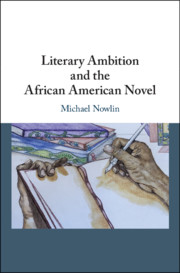Book contents
- Literary Ambition and the African American Novel
- Literary Ambition and the African American Novel
- Copyright page
- Dedication
- Contents
- Acknowledgments
- Abbreviations
- Introduction
- Chapter 1 “The First Negro Novelist”: Charles Chesnutt’s Point of View and the Emergence of African American Literature
- Chapter 2 James Weldon Johnson’s Dream of Literary Greatness and His Groundwork for an African American Literary Renaissance
- Chapter 3 The Strange Literary Career of Jean Toomer
- Chapter 4 Wallace Thurman’s Judgment and the Rush toward Modernism
- Chapter 5 Zora Neale Hurston and the Great Unwritten
- Chapter 6 Richard Wright’s Compromises: Radicalism and Celebrity as Paths to Literary Freedom
- Chapter 7 “Literary to a Fault”: The Singular Triumph of Ralph Ellison
- Conclusion
- Notes
- References
- Index
Chapter 7 - “Literary to a Fault”: The Singular Triumph of Ralph Ellison
Published online by Cambridge University Press: 17 October 2019
- Literary Ambition and the African American Novel
- Literary Ambition and the African American Novel
- Copyright page
- Dedication
- Contents
- Acknowledgments
- Abbreviations
- Introduction
- Chapter 1 “The First Negro Novelist”: Charles Chesnutt’s Point of View and the Emergence of African American Literature
- Chapter 2 James Weldon Johnson’s Dream of Literary Greatness and His Groundwork for an African American Literary Renaissance
- Chapter 3 The Strange Literary Career of Jean Toomer
- Chapter 4 Wallace Thurman’s Judgment and the Rush toward Modernism
- Chapter 5 Zora Neale Hurston and the Great Unwritten
- Chapter 6 Richard Wright’s Compromises: Radicalism and Celebrity as Paths to Literary Freedom
- Chapter 7 “Literary to a Fault”: The Singular Triumph of Ralph Ellison
- Conclusion
- Notes
- References
- Index
Summary
The chapter focuses on the way Ralph Ellison established his literary reputation first by aligning himself with the modernizing step forward representing by Richard Wright, whom he identified as black America’s equivalent to James Joyce, then by self-consciously surpassing Wright with Invisible Man. It touches upon the complex, seven-year gestation of Invisible Man, mainly to reveal the extent to which the novel got increasingly tailored and steamlined for commercial success. It looks at the way the critical reception of Invisible Man neatly fit Ellison’s ambitions for the novel, making him the first African American novelist to be routinely compared to the great European modernists and classic nineteeth-century American novelists. Finally it takes on the question of why Ellison never finished his second novel, situating his struggle in relation to the discourse of “the death of the novel” so prominent in high literary circles in the 1950s. Despite his lifelong attacks on this notion, the chapter argues, Ellison was haunted by it, and condemned by his success as the first “great” African American novelists to aim at nothing short of some synthesis of “the great American novel” and Joyce’s novel-ending Finnegans Wake. It ends with an ironic recognition of the posthumous state of Three Days Before the Shooting as more a book for academics than for the broad American public for whom Ellison thought the novel so essential.
Keywords
- Type
- Chapter
- Information
- Literary Ambition and the African American Novel , pp. 177 - 210Publisher: Cambridge University PressPrint publication year: 2019

